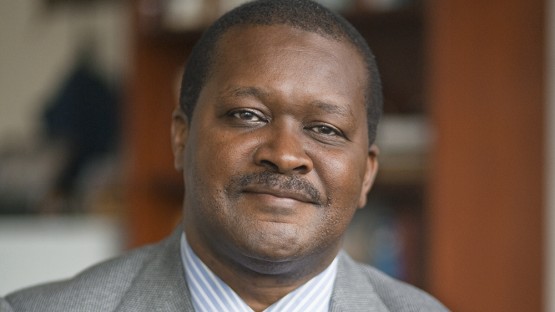Lynden A. Archer, the James A. Friend Family Distinguished Professor in Engineering, has been named the Joseph Silbert Dean of Engineering for a five-year term beginning July 1.
Provost Michael Kotlikoff announced Archer’s appointment today, following approval by the Executive Committee of the Cornell Board of Trustees on June 5.
“Lynden has made many tremendous contributions, to science and society, through his work in energy storage and carbon-capture technology, and he has demonstrated great leadership with the Cornell Energy Systems Institute,” Kotlikoff said. “He is not only one of our most innovative scientists, but is deeply engaged in taking discoveries directly to application; his insight, creativity and commitment to excellence will ensure the university remains a world leader in engineering research and education.”
Archer will succeed Lance Collins, who served two terms as dean.
A Cornell faculty member since 2000, Archer directed the Robert Frederick Smith School of Chemical and Biomolecular Engineering from 2010 to 2016. In the fall of 2017, he was named the David Croll Director of the Cornell Energy Systems Institute, a position he will maintain until a new director is selected.
Archer will assume the College of Engineering’s deanship during the 150th anniversary of the college’s founding, a milestone that has broader relevance for engineering, Archer said. The year 1870 marked the start of the second industrial revolution, when the world was transformed by advances in manufacturing, communications and technology led by engineers. A century and a half later, the world is on the cusp of a so-called fourth industrial revolution, in which big data and portable, intelligent machines are poised to make technology central to every aspect of human life.
“I am excited and humbled by the prospect of leading Cornell Engineering at this challenging moment,” Archer said. “Excited, because our history teaches that it is precisely at times like these that successful institutions seize the moment to define what they value, what they aspire to become and what investments are needed to realize these aspirations. And I’m humbled by the quality and durability of the investments our predecessors made in making the college what it is today.
“Indeed, I cannot help but think of this legacy as a clarion call to service for all Cornellians to – in our time – make the investments in people, infrastructure and programs that will preserve our legacy as a premier institution for learning that is accessible to any person,” he added.
Archer said that maintaining Cornell Engineering’s reputation for excellence in traditional pursuits – knowledge creation, curation and dissemination – is a priority. But he is also committed to seeing the college excel in new domains, such as translating research discoveries for societal impact, expanding opportunity, nurturing and celebrating diversity, and the development of people.
“I believe that Cornell Engineering is well-positioned to lead and influence our peers in each of these domains for the foreseeable future. Our recent investments in Cornell Tech and in developing impactful joint programs with Weill Cornell Medicine have expanded the college’s footprint in New York City. Thisprovides unique opportunities for building strength in computer, data and information science, and in bioengineering,” Archer said.
The College of Engineering houses 207 tenured and tenure-track faculty members, 42 research faculty and lecturers, 8 professors of practice, 170 staff members, and 3,239 undergraduate and 2,115 graduate students, all spanning 10 departments, schools and programs.
With an undergraduate student population that is 50% female and – based on early enrollment numbers – an incoming freshman class in which 25% of students self-identify as underrepresented minorities, the college has outpaced other engineering programs in diversifying. Archer aims to bring that same level of diversity to the graduate student population and faculty.
The college’s research is organized into four strategic areas: advanced materials; complex systems, network science and computation; bioengineering; and energy and the environment. Thanks to its expertise in the last category, Archer anticipates the college playing a key role in helping Cornell meet its commitment to become a carbon-neutral campus by 2035 and, in the process, inspiring peer institutions and actively educating students to be global citizens.
Archer’s own research leverages polymer-nanoparticle hybrid materials to create durable, cost-effective electrochemical energy storage systems. He plans to maintain his research efforts, albeit at a smaller scale, enriching his research team with more postdoctoral researchers who can operate independently.
He is a fellow of the American Physical Society and a member of the National Academy of Engineering. His research has led to the creation of a technology company, NOHMs Technologies, that is commercializing electrolytes for safe lithium batteries. His work has been recognized with numerous awards, including the National Science Foundation award for special creativity; the Thompson-Reuters “World’s Most Influential Scientific Minds” recognition in materials science; and the James and Mary Tien Excellence in Teaching Award.
Archer earned his B.S. in chemical engineering with an emphasis in polymer science from the University of Southern California in 1989 and his Ph.D. in chemical engineering from Stanford University in 1993. He was a postdoctoral member of the technical staff at AT&T Bell Laboratories before entering academia in 1994.















